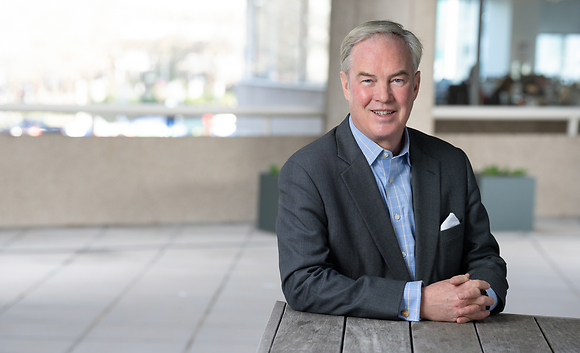VIDEO: MSNBC Interviews Trevor Potter on Campaign Finance Allegations Against President Trump's 2016 Campaign
On December 14, 2018, Caplin & Drysdale’s Trevor Potter sat down with MSNBC’s Chris Hayes to discuss campaign finance allegations against President Trump’s 2016 campaign. Below is a transcript of the interview, and please visit this link, then click and scroll to minute 3.00 to view the interview.
HAYES: Joining me now is Trevor Potter, the former chair of the U.S. Federal Elections Commission and General Counsel to Senator John McCain`s Presidential Campaign 2008. Potter co-wrote The Washington Post op-ed calling Trump`s case weak.
Mr. Potter, your reaction to a certain line we`ve heard from the White House and allies of the President that this is much ado about nothing. In the words of Rudy Giuliani, nobody got killed, nobody got robbed. What do you think?
TREVOR POTTER, LAWYER: Well, people have gone to jail for violations like this and less than this. So as a lawyer Mr. Giuliani knows better. What he`s obviously trying to say is that the campaign finance laws are not as important as say the banking laws, the money laundering laws, rules for which people have gone to jail recently.
I think they are battling in the court of public opinion rather than in the law courts on that issue as they try to say that what has happened in the last couple weeks people going to jail for these offences, being sentenced for three years in the case of Cohen, guilty pleas, are really not – it`s something people should worry about.
HAYES: You were the head of the FEC and you wrote this piece. So explain to me why you think that the – on the law, let`s say the president weren`t the president. He were just individual one who had say, lost. Let`s say he`d lost the election and now he was facing this situation as a real estate developer. Why do you think his case is weak legally?
POTTER: Well, first of all, this is every candidate`s worst nightmare. You do a lot of things in a campaign privately behind closed doors that you assume will never see the light of day. And here the people in the room are telling the world and federal prosecutors what they heard. Even worse there are tapes, there are e-mails, there are multiple witnesses in multiple meetings. So that`s very net bad news for any candidate who has done something that they thought was never going to be heard of a night.
HAYES: Right.
POTTER: In terms of the action – so that`s a bad place to start. Then in terms of what Cohen and the American media executives are saying, they`re saying they had a plan to engage in paying hush money payments that would prevent information from coming out to the public in the middle of the election which they felt apparently each of Cohen and the National Enquirer executives in the conversations with Trump understood that this was something that could affect the election if it came out.
So you have money being spent in an election context for the purpose of influencing an election according to witnesses that was not disclosed and was, in fact, illegal money. In the case of Cohen, it`s more than he`s allowed to spend. In the case of American media, they`re a corporation so they can`t spend money in coordination with a candidate to influence the election.
So illegal money, excessive money, and the allegations in these court pleadings are the President knew about it, the candidate at the time, Candidate Trump, he knew about it. And in the case of Cohen, Cohen says he directed it. So he`s an effectively not only a co-conspirator but he`s the leader of the band telling them what to do.
HAYES: Final question for you. You served as chair of the FEC. You served as general counsel for a presidential campaign that of John McCain. Imagine yourself as the general counsel for a campaign in which the candidate comes to you and says we`ve got this problem. There are women who say I had an affair with them. Can we just rustle up $150,000 of hush money that we`re route through a third party and then reimburse and cover it all up? Is that cool? Is that kosher? Like what`s your answer to that person?
POTTER: I hope I wouldn`t run out of the room screaming but there`s a chance. So you know, the problem is trying to do something like that in a campaign context where expenditures are supposed to be fully disclosed is clearly a problem. You have to say to the candidate, you just can`t do that.
HAYES: Correct.
POTTER: And you know, the White House – the White House makes the argument well, there was the case involving Senator Edwards and he paid money and the jury didn`t convict him. And that`s a pretty weak read here because first of all, the prosecutors charged Senator Edwards. There was a trial. The jury didn`t convict him but they were split on it. And the facts were really different because this all happened before the election had started in Edwards case. It involved payments for a child he had had when his wife was sick. And he said, I didn`t want my wife to know about it and I wanted to pay for my child.
Here this is the month before the election. Unlike the Edwards case here, the two women were threatening to go public –
HAYES: Right.
POTTER: And all the evidence we`ve seen is that the urgency of the campaign was we`ve got to stop them from going public which is what makes it a campaign expenditure. And the Edwards situation did not have those same facts. So I think it comes out differently if it ever ends up in front of a jury.
HAYES: Trevor Potter, thanks for joining us.
Attorneys
- Senior Counsel
